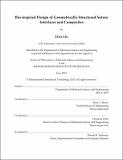Bio-inspired design of geometrically-structured suture interfaces and composites
Author(s)
Lin, Erica (Erica S. C.)
DownloadFull printable version (26.48Mb)
Other Contributors
Massachusetts Institute of Technology. Department of Materials Science and Engineering.
Advisor
Mary C. Boyce and Christine Ortiz.
Terms of use
Metadata
Show full item recordAbstract
Nature is filled with incredible examples of multi-functional materials that have evolved to possess tailored mechanical behavior. This thesis explores the structure-function-property relationship and design principles of geometrically-structured suture interfaces and composites. Suture interfaces are mechanical structures found in rigid natural materials (e.g. human skulls, turtle shells, seashells) that bear loads and provide flexibility for respiration and growth. The geometry of suture interfaces has been shown to vary within species, across species, through development, and over time as organisms evolve. Using mechanical testing of 3D-printed, bio-inspired prototypes, finite element simulations, and analytical modeling, this thesis offers a systematic, comprehensive understanding of the relationship between suture interface geometry and mechanical behavior and provides insight into the suture interface geometries that exist in nature. Triangular, general trapezoidal, and hierarchical suture interfaces and composites are designed, fabricated, and tested. The stiffness, strength, toughness, and failure mechanisms of suture interfaces are shown to be directly influenced by suture geometry. Therefore, mechanical behavior of suture interfaces can be tailored or amplified through small changes in geometry. In addition, the bending behavior of suture composites can also be tailored through changes in suture interface geometry. With a detailed understanding of the deformation mechanisms of suture composites, optimal, multi-scale, hierarchical geometries can be designed.
Description
Thesis: Ph. D., Massachusetts Institute of Technology, Department of Materials Science and Engineering, 2015. This electronic version was submitted by the student author. The certified thesis is available in the Institute Archives and Special Collections. Cataloged from student-submitted PDF version of thesis. Includes bibliographical references (pages 90-93).
Date issued
2015Department
Massachusetts Institute of Technology. Department of Materials Science and EngineeringPublisher
Massachusetts Institute of Technology
Keywords
Materials Science and Engineering.